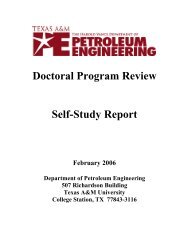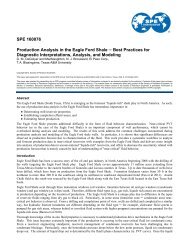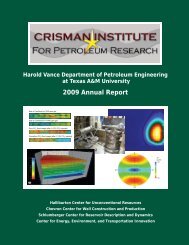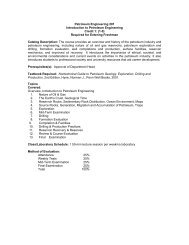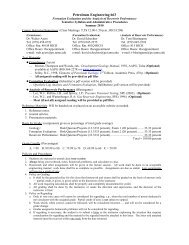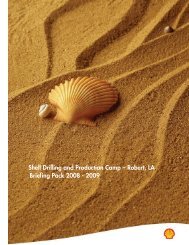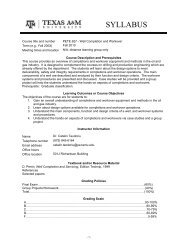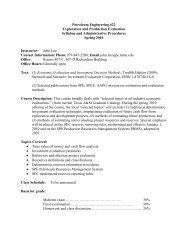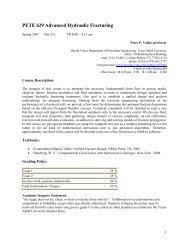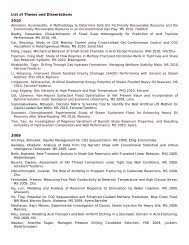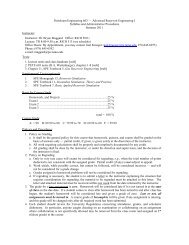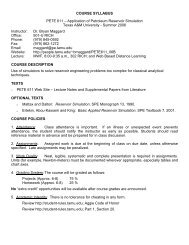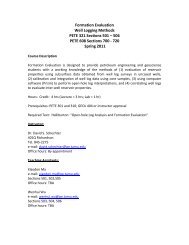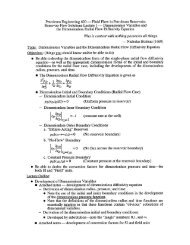Nontechnical Guide to Petroleum Geology, Exploration
Nontechnical Guide to Petroleum Geology, Exploration
Nontechnical Guide to Petroleum Geology, Exploration
You also want an ePaper? Increase the reach of your titles
YUMPU automatically turns print PDFs into web optimized ePapers that Google loves.
Course Learning Outcomes and Relationship <strong>to</strong> Program Outcomes:<br />
Course Learning Outcome: At the end of the course, students will be<br />
able <strong>to</strong>…<br />
Be able <strong>to</strong> categorize petroleum reserves and <strong>to</strong> estimate proved<br />
reserves using volumetric, decline curve, and material balance (p/z)<br />
methods; also, be able <strong>to</strong> forecast future production rates vs. time.<br />
Be able <strong>to</strong> state, in concise summary form, the fundamental forms of<br />
ownership of petroleum resources, and laws, fiscal systems and financial<br />
interests pertinent <strong>to</strong> their exploitation in the United States and<br />
internationally.<br />
Be able <strong>to</strong> perform basic cash flow analysis for petroleum projects and<br />
determine whether proposed projects are acceptable or unacceptable<br />
and, in a given list of acceptable projects, be able determine which<br />
projects are most attractive.<br />
Be able <strong>to</strong> evaluate uncertainty in reserve estimates and economic<br />
appraisal.<br />
Be able <strong>to</strong> set personal financial goals and establish an investment plan<br />
<strong>to</strong> reach these goals.<br />
Be able <strong>to</strong> incorporate social, political, cultural, and environmental fac<strong>to</strong>rs<br />
in<strong>to</strong> decision making.<br />
Program Outcomes<br />
11, 19<br />
12, 22<br />
11, 20, 22<br />
11, 13, 20, 21<br />
9, 14<br />
12, 22<br />
Related Program Outcomes:<br />
No. PETE graduates must have…<br />
9 A recognition of the need for, and an ability <strong>to</strong> engage in life-long learning.<br />
11 An ability <strong>to</strong> use the techniques, skills, and modern engineering <strong>to</strong>ols necessary for<br />
engineering practice.<br />
12 An ability <strong>to</strong> recognize and take in<strong>to</strong> account the constraints offered by political and<br />
social systems, including environmental considerations, in problem definition and<br />
solution.<br />
13 An ability <strong>to</strong> recognize and take in<strong>to</strong> account the difference in perspective of the<br />
scientist and the engineer and <strong>to</strong> focus on engineering problem solving techniques.<br />
14 Specific life and career goals, and the flexibility <strong>to</strong> modify goals and plans as<br />
circumstances dictate.<br />
19 Competency in application of reservoir engineering principles and practices for<br />
optimizing resource development and management.<br />
20 Competency in use of project economics and resource valuation methods for<br />
design and decision making under conditions of risk and uncertainty.<br />
21 An ability <strong>to</strong> deal with the high level of uncertainty in petroleum reservoir problems<br />
in problem definition and solution.<br />
22 An ability <strong>to</strong> take in<strong>to</strong> account the requirements of the free-market commercial<br />
system in which the petroleum industry usually functions, in problem definition and<br />
solution.<br />
Prepared by: W. John Lee, 21 January 2009<br />
2



